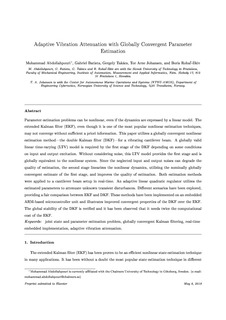Adaptive vibration attenuation with globally convergent parameter estimation
Journal article, Peer reviewed
Accepted version
Permanent lenke
http://hdl.handle.net/11250/2630224Utgivelsesdato
2019Metadata
Vis full innførselSamlinger
Originalversjon
Mechanical systems and signal processing. 2019, 114 512-527. 10.1016/j.ymssp.2018.05.034Sammendrag
Parameter estimation problems can be nonlinear, even if the dynamics are expressed by a linear model. The extended Kalman filter (EKF), even though it is one of the most popular nonlinear estimation techniques, may not converge without sufficient a priori information. This paper utilizes a globally convergent nonlinear estimation method—the double Kalman filter (DKF)—for a vibrating cantilever beam. A globally valid linear time-varying (LTV) model is required by the first stage of the DKF depending on some conditions on input and output excitation. Without considering noise, this LTV model provides the first stage and is globally equivalent to the nonlinear system. Since the neglected input and output noises can degrade the quality of estimation, the second stage linearizes the nonlinear dynamics, utilizing the nominally globally convergent estimate of the first stage, and improves the quality of estimation. Both estimation methods were applied to a cantilever beam setup in real-time. An adaptive linear quadratic regulator utilizes the estimated parameters to attenuate unknown transient disturbances. Different scenarios have been explored, providing a fair comparison between EKF and DKF. These methods have been implemented on an embedded ARM-based microcontroller unit and illustrates improved convergent properties of the DKF over the EKF. The global stability of the DKF is verified and it has been observed that it needs twice the computational cost of the EKF.

